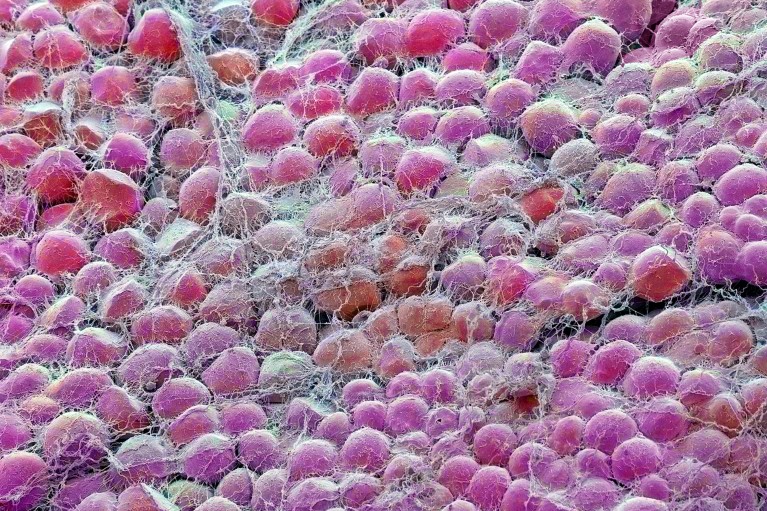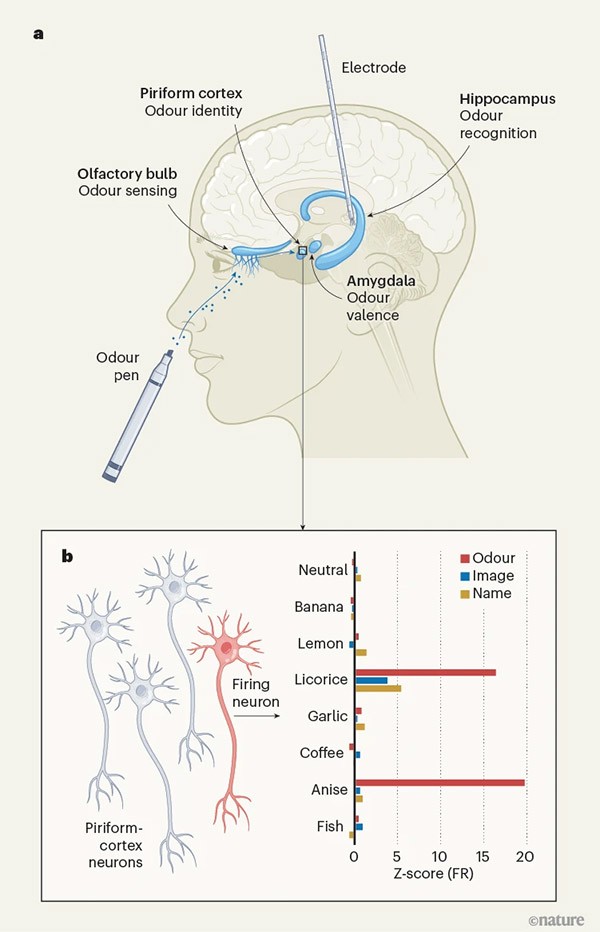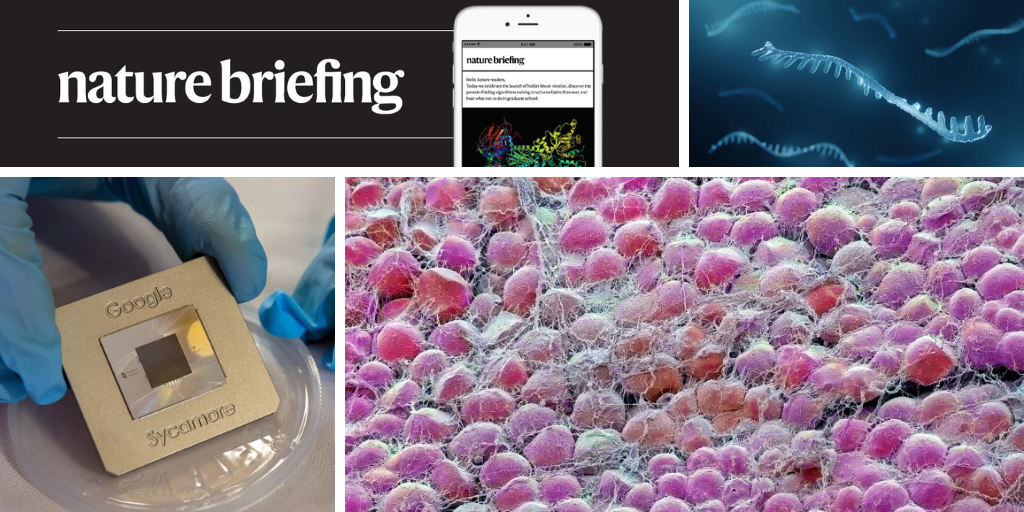Hello Nature readers, would you like to get this Briefing in your inbox free every day? Sign up here.

Fat cells (artificially coloured). Restrictive diets cause fat loss and lengthen life, but the two effects are not necessarily linked.Credit: Steve Gschmeissner/SPL
Weight loss and metabolic changes might not be what lead to a longer life on a low-calorie diet. Researchers fed 960 mice low-calorie diets or subjected them to regular bouts of fasting. While the diet regimens did cause weight loss, factors such as immune health seemed to better explain the link with increased lifespan. Also key was overall resilience, presumably encoded in the animals’ genes, to the stress of reduced food intake. The most-resilient animals lost the least weight, maintained immune function and lived longer.
On Monday, geneticists Victor Ambros and Gary Ruvkun took home the Nobel Prize in Physiology or Medicine for discovering microRNAs. In the two decades since the class of tiny RNA molecules was discovered in C. elegans, researchers have unearthed hundreds of microRNAs in the human genome — some with potential applications such as treating cancer or preventing heart disease. So far, no microRNA-based drugs have been approved by the US Food and Drug Administration, but with funding boosts from pharma firm Novo Nordisk, and similar RNA-based drugs approved, the field might be nearing a tipping point.
Researchers at Google say they have determined the conditions under which quantum computers can beat their classical counterparts. They used a quantum-computer processor called Sycamore to run random circuit sampling, a simple quantum algorithm that generates a random sequence of values. When Sycamore ran in a mode with a lot of noise interference, it could be beaten by classical supercomputers. But when the noise was lowered past a certain threshold, Sycamore’s computation became complex enough that beating it was effectively impossible — by some estimates, it would take the world’s fastest classical supercomputer ten trillion years.
Reference: Nature paper (first reported in a preprint on arXiv)
Toothbrushes and showerheads are hotbeds of unknown viruses — but before you throw yours away, they aren’t the kind that’s harmful to humans. Researchers analysed swabs from 36 toothbrushes and 96 shower heads and found DNA from more than 600 bacteriophages — viruses that infect bacteria. Most of these viruses had never been described before. “It’s amazing how much untapped biodiversity is all around us,” says microbiologist and co-author Erica Hartmann. “And you don’t even have to go far to find it; it’s right under our noses.”
Reference: Frontiers in Microbiomes paper
Features & opinion
“Research is not a tap that you can switch on and off,” says plant geneticist Brenda Wingfield. She spent eight years as deputy dean of research at her institution, a role that, like any senior management job, comes with administrative demands that can make it difficult to keep one foot in research. Wingfield and other scholars who have spent time in management positions gave Nature their tips on how you can keep research creativity flowing during a tenure as one of the higher-ups.
Do you have a work dilemma you’d like some help with? E-mail [email protected]
Many optimistic predictions for our climate future admit that we won’t manage to keep global warming below 1.5 ℃ — but estimate we’ll pull back from the brink of disaster by removing some CO2 from the air. Not so fast, argues a Nature editorial: new research finds that, “even assuming that removing that amount of carbon is feasible, some Earth systems will probably not be restored to their previous equilibrium”. The solution, it will not surprise you to hear, is to cut emissions now. “To wait and scrub the atmosphere later is to court disaster — for people and the planet.”
Reference: Nature paper & Nature Communications paper
In an excerpt from a forthcoming collection of Oliver Sacks’s letters, the neurologist and author describes the first inklings that a new drug called L-dopa would help people with ‘sleeping sickness’: post-encephalitic parkinsonian syndrome. (Sacks would later write about the dramatic, though temporary, benefits in his book Awakenings, which was made into a 1990 film starring Robin Williams and Robert De Niro.) Along with letters to family and luminary friends, Sacks grapples with funding cuts, recalcitrant hospital administrators and disagreeable journal editors.
Infographic of the week

Researchers recorded single-neuron activity from several areas of the brain (a) as people inhaled different odours. They found that the piriform cortex (which receives direct input from the olfactory bulb) identifies the odour, the amygdala processes how pleasant it is and the hippocampus helps to recognize and name the odour.
Some amygdala and piriform-cortex neurons that respond to odour (b) respond to related visual and linguistic cues. For example, a neuron that reacted to the smell of liquorice also responded to an image and the written word ‘liquorice’. (‘Z-score (FR)’ is a normalized measurement of neuronal firing rate.) (Nature News & Views | 7 min read, Nature paywall)
Today I’m considering my sense of self, an awareness that sea walnuts (Mnemiopsis leidyi) seem to lack. Two of the tiny comb jellies can fuse together when injured, making a single body with one nervous and one digestive system — maybe because they don’t have the ability to ‘distinguish self from nonself’, according to invertebrate zoologist Kei Jokura.
Let us know if we can fuse any of your feedback into this newsletter at [email protected]
Thanks for reading,
Jacob Smith, associate editor, Nature Briefing
With contributions by Flora Graham
Want more? Sign up to our other free Nature Briefing newsletters:
• Nature Briefing: Careers — insights, advice and award-winning journalism to help you optimize your working life
• Nature Briefing: Microbiology — the most abundant living entities on our planet — microorganisms — and the role they play in health, the environment and food systems.
• Nature Briefing: Anthropocene — climate change, biodiversity, sustainability and geoengineering
• Nature Briefing: AI & Robotics — 100% written by humans, of course
• Nature Briefing: Cancer — a weekly newsletter written with cancer researchers in mind
• Nature Briefing: Translational Research — covers biotechnology, drug discovery and pharma


